- Home
- Edward Rutherfurd
Russka: The Novel of Russia Page 5
Russka: The Novel of Russia Read online
Page 5
The grazing cows looked up, but did not trouble to move. Across the field, skirting the woods, a buzzard glided over her in search of prey. Kiy was not there.
She took the path that led to the place where they picked mushrooms. The woods at noon were as silent as the field and the sun broke through the cover with a harsh light. She called again: ‘Little Kiy. Kiy, my duck.’
Hanging on a string of twine around her neck was a little talisman – a tiny goose carved out of pine wood – that her mother had given her. She pulled it out and kissed it.
Then she searched the glades where the mushrooms were. But Kiy was not there.
She went on to the pool. Might he have tumbled in? she wondered. Could he be there, under the still, dark water? She gazed at it. There was no sign of any body floating, and surely there was no reason why he should have fallen in, she reassured herself.
Loudly her voice rang through the wood.
She followed the path to the clearing. There she called out several times more, half expecting to hear his reply. Surely he could not have wandered much further?
She went over to the stand of silver birch at the far side of the clearing and, standing still for long moments, she bowed her head before the shining screen they made. The birch was sacred, and friendly: it could help you if you prayed to it. After this she moved on. But now she went the way she knew was eastwards, not guessing that her child, unaware that the wind had changed, had taken the path of the clouds, in another direction. Once she saw a pair of wolves, standing like pale grey shadows by a tree, watching her. For a moment her heart missed a beat. What if Kiy had met them earlier? She could only remind herself that wolves seldom attacked humans in the warm, plentiful summer.
As she went, images came slowly into her mind, lodging themselves, refusing to be cast out: uncertain figures from her people’s folklore – birds of joy and sorrow, birds of prey. For ten minutes her mind was full of the image of fire – fire in the stove at home, bringing comfort; fire in the forest, bringing fear. The two images seemed to impose themselves, one upon the other, so that she could not tell which was which.
Sometimes the trees seemed friendly, about to deliver her son to her from their silent protection; at other times they were dark and threatening. At one moment, in an oak grove, she thought she heard his voice echoing plaintively somewhere to the left and listened, and called, and listened again before moving forward.
She thought of life without him. She imagined the space beside her over the stove, empty. How could she fill that desolate emptiness? Would her kindly husband fill it? No. Another child? She had seen other women in the village who had lost their children. They had wept, pined for a time, then settled down again. They had had other children, lost more. The life of the rod would always go on. But what use was that knowledge to her now? Lebed had known a mother’s anxiety many times, but never a fear like this. It gnawed at her, caused her a pain that she could hardly bear.
If only she could fly, like Baba Yaga the witch, to the top of the great dome of the sky and look down upon all that moved in the forest and upon the steppe below. If she could only see, and cast a spell upon the boy to bring him back.
As she went further east that early afternoon, two thoughts occurred to her. The first was that the child could not have wandered much further: so, as long as he was still alive, he must be lost somewhere in the forest to the right or to the left, if only she could guess which way.
The second thought was more frightening.
For very soon, to the east, came the end of this part of the forest; and there began a new danger: the steppe.
She imagined Kiy walking out from the line of trees into the tall grasses. Nothing would protect him from the burning sun. The grasses would close behind him: he would never find his way out and she would be unable to see him. And what of the animals there? Though the chances of a bear or a wolf attacking the child in high summer in the woods were not high, she had no such hopes if he met a viper, wild dogs, or a polecat in the steppe.
She decided to go on through the wood and then walk along the edge of the steppe, calling into the fringes of the forest as she went. Perhaps, if he had come this far through the wood, he would be tired and might rest in the shadows at the edge. Anxiously, she quickened her pace.
Five minutes later she emerged from the trees.
The steppe lay before her, a vast open sweep. The silence of the summer noon extended to the horizon and beyond. The light fell like a weight upon the land, which shimmered. For a hundred yards, patches of short grass and sedge, blistered but still green in places, provided an introduction to the steppe. Beyond that the tall feather grass – so called because of the long, trailing wisps of plumage it exhibited in spring – stretched in a boundless expanse. Its bleached feathers blended in the middle distance so that the yellow haze of parched grasses seemed to be covered with a white down. Further on, the plain looked brownish and beyond that, glimmering under the line of the horizon, it was the colour of lilac. At first glance, emerging into the heat, there was a sense that the heavy sun had reduced, quelled all living creatures into sleep.
But it was not so. A grasshopper sounded near Lebed’s feet. To her right, a woodlark rose and hovered, bravely singing in the blazing heat. She noticed some hyacinths and irises at the wood’s edge, shrivelled by the summer. Some way in front of her, a dark green patch in the yellow grass told her that a marmot colony inhabited the place.
Several times she called, but neither heard nor saw any sign of the child. She turned left and began to walk north-east, along the forest edge. Ahead of her and to the right, perhaps two miles out into the steppe, was a small but clearly visible mound. It was a kurgan – a tomb – but she did not know who had put it there or when. Her own people seldom built such things.
Some time passed, yet strangely, through the heat haze, the kurgan never seemed to get any closer. The steppe played many such tricks with light, she knew; but today it seemed sinister, ominous. In the far distance, she saw an elegant demoiselle crane with its blue-black neck and white back make its way swiftly towards a hidden nest. Several times as she went along, she turned back into the trees, making a circle to search for Little Kiy before emerging into the glare of the steppe again.
At last, the kurgan seemed to be getting nearer; and at the same time, she came to a thin promontory of woodland extending from the left out into the steppe. She started to walk through the line of the trees.
The camp of the horsemen lay just the other side of the trees. She saw it as she came through, not a hundred paces away.
And she saw that they had her child.
The five wagons had canopies made of bark. They were arranged in a circle, making a modest ring of hot and dusty shadows in the huge brightness of the steppe. Several of the horsemen had dismounted and lay under the wagons.
Outside the little circle, two men remained mounted. One of them was fair-haired, the other dark. The dark warrior addressed the other, the leader of the expedition.
‘Brother of mine, let us find the village.’
The fair-haired horseman gazed at the child his blood brother held before him on the neck of his powerful black horse. The child was pale and stared about him with large frightened eyes. A good-looking little boy.
His blood brother’s long raven hair glistened in the sun, almost as sleek as the flanks of his black mount.
The village could not be far from where the boy had been wandering. They would take a few of the young men and male children away with them while the villagers protested powerlessly. And these would be trained as warriors – not as slaves, but as adopted members of the clan. Two of the horsemen resting under the wagons had been taken from Slav villages in this way when they were young. A strange people, he thought: they had no god of war, yet once trained they made brave and excellent fighters. No doubt the little boy in front of him would be a credit to the clan one day.
That hot afternoon, however, he did not want to raid a villa
ge. ‘I came for another purpose,’ he said softly.
The dark horseman inclined his head. ‘Your grandfather did not live to be old,’ he replied gravely. ‘Not for nothing was he called The Deer.’
These were the highest compliments among the horsemen of the steppe. Among them, an old man was without honour – brave men died in battle before they grew old.
It had been a little while before, as the sun reached its zenith that day, that the fair-haired warrior had stood on the top of the solitary kurgan that lay in the steppe nearby, and plunged a long sword into it. For this was the tomb of his grandfather, killed in a skirmish in this half-forgotten place; forgotten, that is, except by his family who would return every few years to honour him in this remote corner of the steppe. The sword stood there now, its crossed handle just visible from the wagons, a gleaming iron reminder of a noble warrior clan.
Kiy stared at the horseman. He had never seen such men before, but he had heard of them. The man on the black horse, he guessed, was a Scythian.
‘If a Scythian catches you,’ his father had once told him, ‘he’ll skin you alive and use your skin for horse-trappings.’ Kiy looked at the reins anxiously. His first sight of the dark warrior’s cold eyes had made him expect the worst and now he supposed they were discussing how to cut him up. He was trembling. And yet, as he stared up at the fair-haired horseman, he wondered if there might be hope. For, despite his terror, he was also thinking that this was the most splendid figure he had ever encountered in his life.
Unlike his Scythian blood brother, the tall fair horseman had his hair cut short. The features of his handsome, oval face were regular, refined, almost delicate; his expression was open and pleasant. But when his pale blue eyes flashed in anger, he was truly terrible – more frightening even than the dark Scythian in front of him. So fearsome was the gaze of the men of his tribe that it was remarked upon by several authors in antiquity.
For he was an Alan – the greatest of all the Sarmatian tribes – and the mighty clan to which he belonged one of the proudest of all, who called themselves the ‘pale’ or ‘radiant’ ones.
Since time out of mind, horsemen had come from the east, from Asian lands that lay beyond that huge crescent of mountain chains that bordered the mighty Eurasian plain to the south. Through the passes above India and Persia they had ridden, through the shimmering haze of the foothills, streaming down on to the vast plain. From the desert they had come, round the Caspian Sea, over the River Volga, and thence to the rich steppe north of the Black Sea, to the lands of the Dniepr River and the Don. They had even penetrated to the eastern Mediterranean and the Balkan Mountains above Greece.
First, in distant antiquity, came the Cimmerians, iron-age horsemen. Next, about 600 BC, the Scythians – an Indo-European people with a mixture of Mongol race, who spoke an Iranian tongue. Then, around 200 BC, and mightier yet, another Iranian-speaking people – the Sarmatians – had swept over the land, reducing the Scythians to a small area and dominating them.
They came from the east, these warrior clans with their noble princes. They gave an Iranian name – Don, meaning water – to the Rivers Don, Dniepr, and even the more westerly Danube. They were nomadic warrior lords of all the steppe.
From the Black Sea to the forest’s edge, the Slavs feared and admired the radiant Alans. Some Slav tribes worked for them; others paid tribute. Widely indeed did they roam: as they proclaimed in their heroic folk tales, they rode the wide prairies from the land of the warm sun to the land of the sunset.
The Alan glanced up at the sky. The afternoon was still hot, but in a little while the men under the wagons would finish their sleep and it would be time to move.
‘We return today,’ he said quietly. ‘You have the boy.’
Kiy could not take his eyes off the tall warrior. Unlike his Scythian blood brother, the Alan used stirrups. He wore soft leather shoes and billowing silk trousers. By his side hung a long sword and a lasso – a favourite weapon of his people – and a dagger with a ring on top was fastened to his leg. His coat of mail and pointed helmet were strapped to a pack on the ground near the wagons, together with two of the long spears which the Alans used to mount their devastating charges. The cloth doublet he wore was sewn with little open triangles of gold; around his neck was a golden torc of golden wires with ends fashioned as golden dragons. Over his shoulders was a long cloak made of wool and held with a huge pin richly studded with oriental gems. And that was all his personal ornament.
The Scythian was differently dressed. Kiy felt his back scratched by the gold and silver ornaments sewn on to the Scythian’s leather jerkin. On the dark arm that held him was a bracelet carved with fantastic gods and animals. Kiy did not know that this wonderful work was Greek: all he knew was that it hurt his eyes as it flashed in the sun. At the Scythian’s side hung a scimitar, its handle carved with Greek designs.
But even more splendid and more enthralling to the trembling child were their horses. Though he could only partly see the jet black horse beneath him, he could sense the huge power of the animal as he sat astride its neck. And as for the horse upon which the Alan sat – it might have been, for all he knew, a god.
It was silver grey, with a black mane, a black stripe down its back, and a black tail. The Alans called this noble colouring ‘hoarfrost’. As he watched this graceful animal move, it seemed to Kiy that the horse stalked over the ground as though it barely deigned to touch it. Such a creature, he thought, would not gallop: it would fly.
And indeed he was right: for there was no fleeter mount in all the Alan’s tribe. He called this noble animal Trajan, after the Roman emperor whose heroic reputation had spread round the shores of the Black Sea and who had been adopted as a minor god even by the far-flung Sarmatians. Three times in battle Trajan had saved the Alan’s life by his extraordinary sureness of foot. Once, when he had been wounded, it was the horse who had got away from his captors and come to search for him. It was as a compliment to the Alan and his horse that men said of him: ‘He loves Trajan more than his wife.’
Trajan was still now; but the faint breeze on the steppe caught the small golden discs that hung from his bridle and made them twinkle. On each disc was incised the tamga – the emblem of the clan of which the horse, like his master, was considered a member. The tamga of the clan was a three-pronged trident – a sacred sign that hung over the hearth in the clan’s ancestral tower, hundreds of miles away to the east.
The Scythian, too, looked at Trajan. And almost sighed. Amongst his native people, such a god-like steed would be buried with his master in the kurgan when at last he had fallen in battle. The Alans, great horsemen though they were, usually were content to go to their rest with only their horse’s bridle and equipage.
His father and the Alan’s had fought together as mercenaries for Rome, and he and the Alan had become blood brothers when they were boys. No bond was more sacred: it could not be broken. For years they had travelled together, fought side by side. Never, in anything, had the Scythian ever failed the Alan. If need be, he knew without a doubt, he would die for his friend.
Yet as his hard eyes rested for the thousandth time on Trajan, they took on a strange, dreamy quality. If he were not my brother, he thought to himself, I would kill him, even a hundred like him, for such a horse. The horse stared back at him, proudly. Aloud the Scythian said: ‘Brother of mine, will you not let me take two of our men, raid the village, and follow you? I will come up with you by sunset tomorrow.’
The Alan gently stroked his horse’s neck. ‘Do not ask this of me now, brother,’ he replied.
The Scythian was silent and thoughtful. Both men knew that the Alan could not refuse his blood brother anything – no gift, no favour, no sacrifice could ever be too great. This was their custom, and their honour. Had the Scythian asked formally for the horse, his brother would have given him Trajan. But a blood brother did not abuse his right: he must know when not to ask. And so now the dark man bowed his head and it was as if the sugges
tion of the village raid had never been.
Then Little Kiy looked across the grass and cried out.
She came walking towards them in the heat of the day. The long yellowing grass brushed harshly against her bare legs.
Lebed did not know whether they would kill her or not, but she had nothing to lose. As she approached, something told her that the handsome Alan was their leader, but she was not sure. The two men were watching her impassively. Even their horses did not move.
Kiy instinctively struggled to get free, but found that the Scythian’s dark arm that seemed to hold him so carelessly, was as hard as iron. Yet even now, it did not cross the child’s mind that, once his mother arrived, these strange and terrible horsemen would not deliver him up to her.
She called to him: ‘Little Kiy.’
And he replied. How was it, he wondered, that the horsemen were ignoring her?
Lebed looked up at their eyes; the dark eyes of one, the pale blue eyes of the other: both seemed equally hard. The Scythian slowly began to reach across towards his scimitar; but then his hand hovered in front of the child and came to rest on his horse’s mane.
She was only ten paces from them now. She could see Kiy’s expression and understood it – his face first lit up with joy and hope at the sight of her; then puckered up in frustration and misery at his powerlessness to reach out to her. She noticed that some of the men and the horses by the wagons gazed at her curiously, but without stirring. Then Lebed stopped, folded her arms, and stood there with her feet apart, facing the two horsemen.
A breath of wind sent a faint ripple across the tall feather grasses which smelled sweet. The sun shone, heavily, upon their heads. The helmet of the Scythian glittered. No one spoke.
The Alan knew some words of Slavic. Finally, from his great height looking down from Trajan, he addressed her curtly.
‘What do you want?’
Lebed did not look at him. She looked at her son on the Scythian’s black horse, and said nothing.

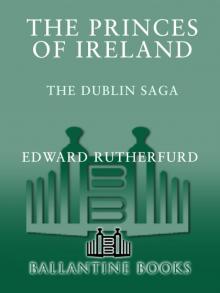 Princes of Ireland
Princes of Ireland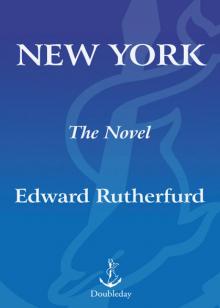 New York
New York Sarum
Sarum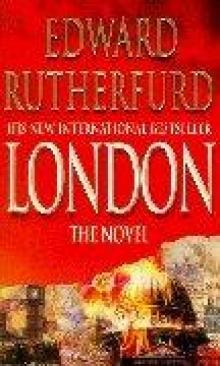 London
London Russka: The Novel of Russia
Russka: The Novel of Russia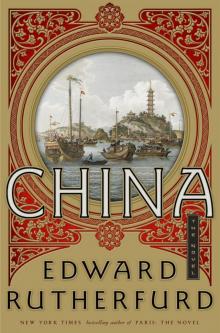 China
China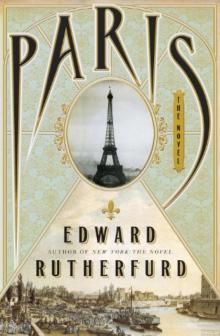 Paris
Paris The Forest
The Forest Russka
Russka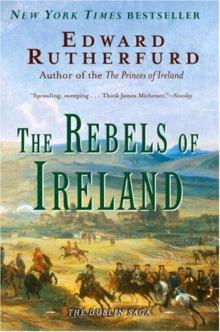 The Rebels of Ireland: The Dublin Saga
The Rebels of Ireland: The Dublin Saga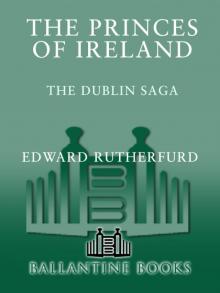 The Princes of Ireland
The Princes of Ireland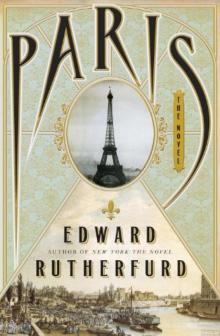 Paris: The Novel
Paris: The Novel